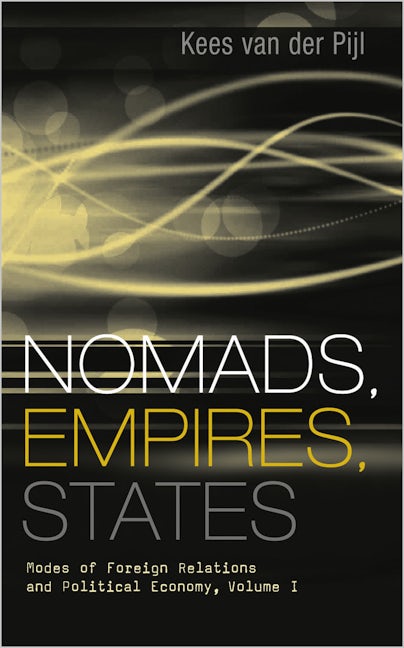
Nomads, Empires, States
Modes of Foreign Relations and Political Economy, Volume I
A case for a re-reading of world history in terms of foreign relations
*Shortlisted for the Deutscher Memorial Prize 2008*
How we think about international relations theory needs to change. Kees van der Pijl argues that by making the "nation-state" the focus of international relations, the discipline has become Euro-centric and a-historical and that theories of imperialism and historic civilisations, and their relation to world order, have been discarded. With more than half the world's population living in cities, with unprecedented levels of migration, global politics is present on every street corner. The 'international' is no longer only a balance of power among states, but includes tribal relations making a comeback in various ways.
Outlining a new approach to IR theory, the book makes a case for a re-reading of world history in terms of foreign relations, and shows what it reveals about both our past and our future.
This book is available to download through the Open Access programme.
Kees van der Pijl is a Fellow of the Centre for Global Political Economy and Professor Emeritus at the University of Sussex. His books include The Disciple of Western Supremacy (Pluto, 2014) The Foreign Encounter in Myth and Religion (Pluto, 2010), the Deutscher prize-winning Nomads, Empires, States (Pluto, 2007).
'Van der Pijl's innovative concept 'modes of foreign relations'challenges Marxists to revisit international relations and encouragesinternational relations specialists to broaden their horizons as herelates a fascinating interpretation of global politics stretching fromnomads to Empires, old and new. A wonderful, provocative book'
- Robert O'Brien, Professor of Global Labour Issues, McMaster University'Tracing the history of foreign relations, Kees van der Pijl shows that they are inscribed in daily life. Nomads, Empires, States is an artful study that redefines the field of international studies'
- James H. Mittelman, Professor, School of International Service, American University, Washington, DC'His highly accessible tour de force is rich, provocative, and interesting. It is also important for an understanding of this difficult and (hopefully) transitional moment in history'
- George Wright, Professor Emeritus, Department of Poltical science, California State University.'A masterful work of historical materialism, showing how human social organisation proceeds from its manipulation of nature and technology, how human social organisations are transformed through their 'foreign relations' with other such organisations, and how such relations are becoming internal rather than 'international'. Whatever one might think of the human future after reading this book, it will certainly leave one thinking about it'
- Ronnie D. Lipschutz, Professor of Politics University of California, Santa Cruz'An intellectual tour de force! This important, innovative and insightful book challenges the dominant Euro-centric and state-centric approach to International Relations. By offering an alternative framework based on the concept of 'modes of foreign relations,' Van der Pijl takes us on a journey through time that allows us to grasp the origins and development of 'relations between communities.''
- Susanne Soederberg, Canada Research Chair, Department of Development Studies, Queen’s University, Canada.'A work of scholarship, imagination, cogency and irreducible humanistic optimism'
- Professor Fred Halliday, LSE'Provides a majesterial and authentic historical materialist account of 'foreign relations' that is at once conceptually innovative and deeply historical. This impressive work deserves a very wide readership, particularly by those of us who recognise the importance of van der Pijl's subject but make use of different theoretical traditions'
- Dr Randall Germain, Associate Professor, Carleton University, Canada.'Synthesises a massive amount of research in dividing human history into four main modes of foreign relations: tribal, empire/nomad, sovereign equality, and global governance. A convincing case is made for the power of his theorisation of our past and its crucial contribution not only for understanding the present, but also for mapping the paths to desirable futures'
- Robert Albritton, Professor Emeritus, York University, Toronto, CanadaPreface
1. Foreign Relations and the Marxist Legacy
2. Tribal Encounters
3. Imperial Universalism and the Nomad Counterpoint
4. The Conquest of the Oceans-Ethnogenesis of the West
5. Worlds of Difference
References
Index
135mm x 215mm

